- Rebecca Dovi
- Director of Education
- Presenter’s NSFRESOURCECENTERS
- CodeVA
- Debra Bernstein
- https://www.terc.edu/profiles/debra-bernstein/
- Senior Researcher
- Presenter’s NSFRESOURCECENTERS
- TERC
- Michael Berson
- https://www.usf.edu/education/faculty/faculty-profiles/michael-berson.aspx
- Professor, Social Science Education
- Presenter’s NSFRESOURCECENTERS
- University of South Florida
Reaching Across the Hallway
NSF Awards: 2010256
2022 (see original presentation & discussion)
Grades 6-8
Interviews with middle school computer science teachers currently participating in the Reaching Across the Hallway grant.
Computer Science, Integrating STEM and CS, Instructional Materials
CodeVA
Discovery Research PreK-12 (DRK-12)
Related Content for Reaching Across the Hallway
-
 2021Integrating Computer Science and Social Studies in MS
2021Integrating Computer Science and Social Studies in MS
Bryan Wallace
-
 2019Cybersecurity for Middle School Teachers and Students
2019Cybersecurity for Middle School Teachers and Students
Laurin Buchanan
-
 2017Building systems from Scratch
2017Building systems from Scratch
Gillian Puttick
-
 2020Computational Thinking Professional Development Course
2020Computational Thinking Professional Development Course
Margaret Cozzens
-
 2018SPARCS - computer science in middle school classrooms
2018SPARCS - computer science in middle school classrooms
Harvey Siy
-
 2021BRBytes: Expanding K-12 Computer Science in Louisiana
2021BRBytes: Expanding K-12 Computer Science in Louisiana
Juana Moreno
-
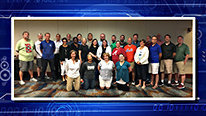 2019Infusing Cooperative Learning into CS Principles Courses
2019Infusing Cooperative Learning into CS Principles Courses
Jeff Gray
-
 2018Learning to Program by Modding Minecraft
2018Learning to Program by Modding Minecraft
Bruce Segee
This video has had approximately 234 visits by 180 visitors from 90 unique locations. It has been played 69 times as of 05/2023.
Map reflects activity with this presentation from the 2022 STEM For All Video Showcase website, as well as the STEM For All Multiplex website. 
Based on periodically updated Google Analytics data. This is intended to show usage trends but may not capture all activity from every visitor.
Playlist: DRK-12 Videos Playlist 2022
Videos made by projects funded by the NSF DRK-12 program from the 2022 Video Showcase.
-
 2022Supports for Sustaining Professional Development Outcomes
2022Supports for Sustaining Professional Development Outcomes
Cathy Ringstaff
-
 2022Innovate to Mitigate: Environmental Innovation Challenges
2022Innovate to Mitigate: Environmental Innovation Challenges
Gillian Puttick
-
 2022Adaptive Dialog: Teachers & Students Deepen Science Ideas
2022Adaptive Dialog: Teachers & Students Deepen Science Ideas
Marcia linn
-
 2022Inquiry-to-Action through Project-Based Inquiry (PBI) Global
2022Inquiry-to-Action through Project-Based Inquiry (PBI) Global
Hiller Spires
-
 2022Impact Study: STEM-Innovation and Design (STEM-ID) Courses
2022Impact Study: STEM-Innovation and Design (STEM-ID) Courses
Meltem Alemdar
-
 2022Exploring Virtual Reality with Secondary STEM Teachers
2022Exploring Virtual Reality with Secondary STEM Teachers
Nastassia Jones
-
 2022STEM Teaching in Rural Areas with Cultural Knowledge Systems
2022STEM Teaching in Rural Areas with Cultural Knowledge Systems
Lynda McGilvary
-
 2022Teachers' Culturally Relevant Engineering Self-Efficacy
2022Teachers' Culturally Relevant Engineering Self-Efficacy
Julie Robinson
-
 2022MindHive: Citizen Science in the High School Classroom
2022MindHive: Citizen Science in the High School Classroom
Lucy Yetman-Michaelson
-
 2022Rural Science Teachers Learn 3D
2022Rural Science Teachers Learn 3D
Rebecca Sansom
-
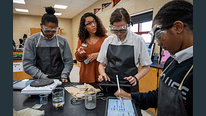 2022The SPIRAL e-portfolio system for professional reflection
2022The SPIRAL e-portfolio system for professional reflection
Jose Felipe Martinez
-
 2022Community Science Investigations for Social Justice
2022Community Science Investigations for Social Justice
Kevin Cuff
-
 2022Empowering Teachers in the Face of COVID: A STEM PD Model
2022Empowering Teachers in the Face of COVID: A STEM PD Model
Ellen Meier
-
 2022Building Data Literacy Through the Arts
2022Building Data Literacy Through the Arts
Anna Amato
-
 2022Teaching Early Algebra through Example-Based Problem Solving
2022Teaching Early Algebra through Example-Based Problem Solving
Meixia Ding
-
 2022Language, Culture & Knowledge Building through Science
2022Language, Culture & Knowledge Building through Science
Cory Buxton
-
 2022A Study of STEM Learning Ecosystems in Maine
2022A Study of STEM Learning Ecosystems in Maine
Kelly Riedinger
-
 2022Broadening Access to Algebra: An Intervention for Grades K–2
2022Broadening Access to Algebra: An Intervention for Grades K–2
Maria Blanton
-
 2022Integrating Student Voice into Assessment Item Design
2022Integrating Student Voice into Assessment Item Design
Leanne Ketterlin Geller
-
 2022Developing, Enacting, Researching Anti-bias Math Education
2022Developing, Enacting, Researching Anti-bias Math Education
Eva Thanheiser
-
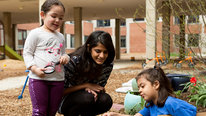 2022Linking Science with Eng and Math across Home and School
2022Linking Science with Eng and Math across Home and School
Ximena Dominguez
-
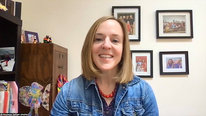 2022Video in the Middle: Asynchronous Online Mathematics PD
2022Video in the Middle: Asynchronous Online Mathematics PD
Angela Knotts
-
 2022Accessible Computational Thinking in Elementary Science
2022Accessible Computational Thinking in Elementary Science
Lautaro Cabrera
-
 2022Teaching Amidst Uncertainty - Project TAU
2022Teaching Amidst Uncertainty - Project TAU
Elizabeth Metts
-
 2022Ed+gineering Brings Robotics Home During COVID
2022Ed+gineering Brings Robotics Home During COVID
Jennifer Kidd
-
 2022Connecting Math to the Real World
2022Connecting Math to the Real World
Mathew Felton-Koestler
-
 2022The EYE Unit: Placed-based Energy Literacy
2022The EYE Unit: Placed-based Energy Literacy
Laura Zangori
-
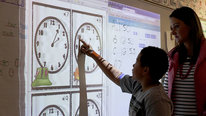 2022Multilingual Learners and Elementary Science Achievement:
2022Multilingual Learners and Elementary Science Achievement:
F. Chris Curran
-
 2022STEM SEALs: Building an Evidence Base and Seeding Transforma
2022STEM SEALs: Building an Evidence Base and Seeding Transforma
Adrienne Smith
-
 2022Biologically Inspired Design: Teacher PD at Zoos and Gardens
2022Biologically Inspired Design: Teacher PD at Zoos and Gardens
Michael Helms
-
 2022Advance equity & strengthen teaching through math modeling
2022Advance equity & strengthen teaching through math modeling
Erin Turner
-
 2022Teacher Learning for Citizen Science
2022Teacher Learning for Citizen Science
Patrick Smith
-
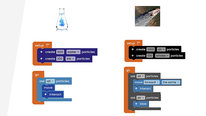 2022Integrating Data & Modeling for Science Learning in School
2022Integrating Data & Modeling for Science Learning in School
Aditi Wagh
-
 2022Misconceptions: From Roadblocks to Stepping Stones
2022Misconceptions: From Roadblocks to Stepping Stones
Susan Sunbury
-
 2022Integrating Environmental Restoration with Computer Science
2022Integrating Environmental Restoration with Computer Science
Dr. Lauren Birney
-
 2022Critical and Cultural Approaches to K-6 Science
2022Critical and Cultural Approaches to K-6 Science
JESSICA THOMPSON
-
 2022StoryMaker: Scaling STEM Inquiry Through Youth Media
2022StoryMaker: Scaling STEM Inquiry Through Youth Media
Leah Clapman
-
 2022Engaging young scientists in publication of their science
2022Engaging young scientists in publication of their science
Sarah Fankhauser
-
 2022STEAM Your Way to College
2022STEAM Your Way to College
Shakhnoza Kayumova
-
 2022Studying Mathematical Teacher Noticing with 360 Video
2022Studying Mathematical Teacher Noticing with 360 Video
Karl Kosko
-
 2022Reaching Across the Hallway
2022Reaching Across the Hallway
Rebecca Dovi
-
 2022MC2: Synthesizing Key Ideas about Collaborative Learning
2022MC2: Synthesizing Key Ideas about Collaborative Learning
Dalila Dragnic-Cindric
show more
Discussion from the 2022 STEM For All Video Showcase (14 posts)



Michael Berson
Professor, Social Science Education
Welcome to our Reaching Across the Hallway project! We hope that you enjoy watching our video and hear from our amazing participating teachers. We are focusing on powerful connections highlighting the integration of computer science and social studies into rural middle schools in Virginia.
Rebecca Dovi
Anita Crowder
Anita Crowder
Innovative project integrating social studies and computer science. I love the feedback from the teachers. Thank you for sharing!
Rebecca Dovi
Michael Berson
Debra Bernstein
Senior Researcher
Thank you, Anita!
Michael Berson
Catherine McCulloch
Senior Project Director
Thank you for the video. I'm curious about what you're learning about this model and the outcomes. Has there been anything that's surprised you so far?
Rebecca Dovi
Michael Berson
Michael Berson
Professor, Social Science Education
We have been excited to see all of the potential intersections between social studies and computer science; however, we also have noted the complexity of navigating the disciplinary specific ways of knowing that guide practice in the classroom. Exploring these intersections requires flexibility in thinking, planning, and implementation. Teachers in rural communities may be more isolated from peers, and benefit from shared communities of practice that promote innovation.
Rebecca Dovi
Michael Berson
Denice Blair
Great project! I love the focus on helping teachers develop ways to engage students with data, especially with looking at questions and results from various perspectives. There are so many online data sources available that would be informative for students to explore. As a museum educator who focuses a lot on history and culture, I can see how your project supports teachers in getting students excited about history - a definite win!
Rebecca Dovi
Michael Berson
Debra Bernstein
Senior Researcher
Thank you, Denice, for your comment. In this coming year, data and analysis will be one of our focal concepts in the teacher workshops. We are excited about the possibilities too!
Rebecca Dovi
Michael Berson
Mike Szydlowski
K-12 Science Coordinator
Thank you for this great project summary! Now that this has been explored, I would love to hear about a future project idea one or more of the teachers have.
Michael Berson
Michael Berson
Professor, Social Science Education
Mike- Thank you for the note. We are continuing to explore meaningful intersections between computer science and the social studies content. In their lesson design a few of the teachers have been looking at cybersecurity with connections to historical events.
Michael Berson
Debra Bernstein
Senior Researcher
Thanks, Mike. To add to Michael's comment, other teachers have examined sequences of activities (like the steps of how a bill becomes a law) and compared these sequences to algorithms.
David Campbell
Program Officer, retired
This is an interesting idea. Who do you think has benefitted the most, computer science teachers who have learned applications of computer skills, or history teachers who have learned the utility of CS for analyzing data?
Michael Berson
Michael Berson
Professor, Social Science Education
Fortunately we are seeing benefits for both social science teachers and computer science teachers. Our project focuses on rural middle schools where collaboration is critical in daily instructional operations.
Michael Berson
Maria (Mia) Ong
These narratives are powerful testimonies about how the project is changing both teachers' skill set and the way they teach. I'm curious to know what you think is unique about rural contexts for your project objectives. What might be the same, and what might be different compared to, say, urban contexts? Also, what implications for inclusion and equity do you see for this work?
Michael Berson
Michael Berson
Professor, Social Science Education
Great questions! In some of our schools there may only be one or two social studies teachers. Due to the size/population numbers there may only be just one faculty member teaching a given social studies topic (i.e. American History I or American History II). Building community through collaboration is a very important aspect of our project. Additionally some of our rural divisions (districts) are located a great distance from each other. We have been effective using digital collaboration tools to bring the participants together.
Michael Berson
Further posting is closed as the event has ended.